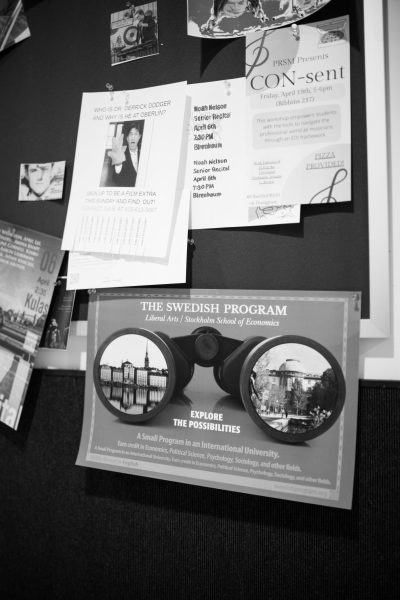Sachs Touts Distorted Realities, Childish Arguments
Howard Sachs’ article, “American College System Destroys Real Liberalism,” (The Oberlin Review, April 6, 2018) challenges the widely held opinions on this campus and the general state of higher education, attacking what they deem as the “child-like value system” of leftism. This is a controversial opinion, and I applaud Sachs for attempting to make their case. However, the author’s argument is unendingly naive, childish, and condescending to a point where it both undermines their case and completely distorts constitutional conservatism.
I have grown to respect the scholarship of constitutional conservatives after much reading and deliberation. Scholars like Kori Schake, the deputy director general of the International Institute of Strategic Studies and a well-reasoned scholar of foreign policy; or Randy Barnett, professor of law at Georgetown University Law Center specializing in both the libertarian theory of law and constitutional law; or Harry V. Jaffa, who was professor emeritus at Claremont McKenna College in political philosophy and one of the formative thinkers of American conservatism — all are masterful scholars and argue their positions beautifully. There have been well-argued pieces in the National Review, in the Manhattan Institute’s City Journal, and in the Independent Institute’s Independent Review. Sachs does not even try to reach the quality or good faith of these scholars and publications. At best, Sachs is a dirty, soggy napkin stuck to conservative intellectualism’s door.
Sachs begins their argument with: “First, like [it] or not, believe it or not, leftism is a child-like value system. It appeals to people because all of us have a deep and strong drive to be taken care of … They want to be taken care of by a mom-and-dad government. Now, they don’t even want to hear opinions they disagree with, so they shriek and shout down speakers or run to safe spaces built by childish administrators.” Not only is this argument amazingly reductionist, but it reeks of projection and hypocrisy. I find it amusing that a person writing that their belief system isn’t respected in the current status quo turns around and attempts to negate the other side’s positions with condescending language. There are criticisms to be made of what Sachs deems as “leftism,” just as there are criticisms to be made of constitutional conservatism.
It does a great injustice to our national political debate to present your side as the only “adult” side on a complicated discussion. When an argument is essentially simplified to “my side is the only responsible opinion in the room” and “evil is always with us here on earth,” it eliminates a great amount of nuance that is at the heart of our discussion. We understand that no side has all of the answers or can solve all of our problems — pretending that there is nothing to be gained from the other side is a fundamental flaw in Sachs’ argument.
At the base of Sachs’ argument is the idea of the “anti-child — the values of freedom, self-reliance, strength, bravery, traditions, dignity, and manhood. These are the values that teach us the realities of life. One of the great teachings is that nothing is free.” This is a fundamentally immature argument, embodying the primitive notion that might makes right, with no added recognition of the complexities of the human condition. No mention is made of the values of social welfare through universal access to medical care, or the gains from a more educated populace, or stronger families from subsidized maternal leave, or added productivity to our economic system through subsidized daycare. For Sachs, this is simply “free this and free that,” with no concern that our nation has the worst rate of maternal mortality in the developed world, or that the ability for social mobility in the United States is actually much less than that of social-democratic countries, or that the economic gains for certain subsidized activities can greatly outpace their costs. Not only are these opinions unendingly naive, they’re also dangerous to both the health of the American people and democracy.
Make no mistake; Sachs is right that there is a great concern of an overbearing totalitarian state, and that there are valid criticisms to be made of the political ideologies of the students and faculty of this campus. However, Sachs’ arguments lack nuance, cannot stand up to criticism, and only attempts to approach the opposition by claiming their arguments are immature. It’s easy to stay in your own political echo chamber — both Sachs and students at this campus are guilty of that — but the real challenge is coming up with reasonable solutions.
Sachs’ article has added nothing worthwhile to the quality of our political discourse. This overt attack on “leftism” leaves us with no solutions, no insights, and no policy proposals. At best, Sachs gives us opinions that are frankly childish — just as he claims “leftism” is — by giving a near-Freudian view of human nature (I say near-Freudian because it would be insulting to Sigmund Freud to ascribe Sachs’ ideologies to him), defends gun ownership, and goes back to denigrating “leftism.”
What have we gained after reading Sachs’ piece? A way to waste ten minutes of our day.
It’s important to read and understand the perspectives of our political opposition. However, such attempts must be made on a platform of mutual respect, or we’ll all end up further entrenched in our political echo chambers. There are significant criticisms to be made of the political culture, opinions, and perspectives of Oberlin students and faculty. Sachs does not make them. The only thing Sachs makes is a mockery of political discussion, debate, and conservative intellectualism. Let’s actually debate with substance and stop this partisan-baiting style of condescending argumentation.


